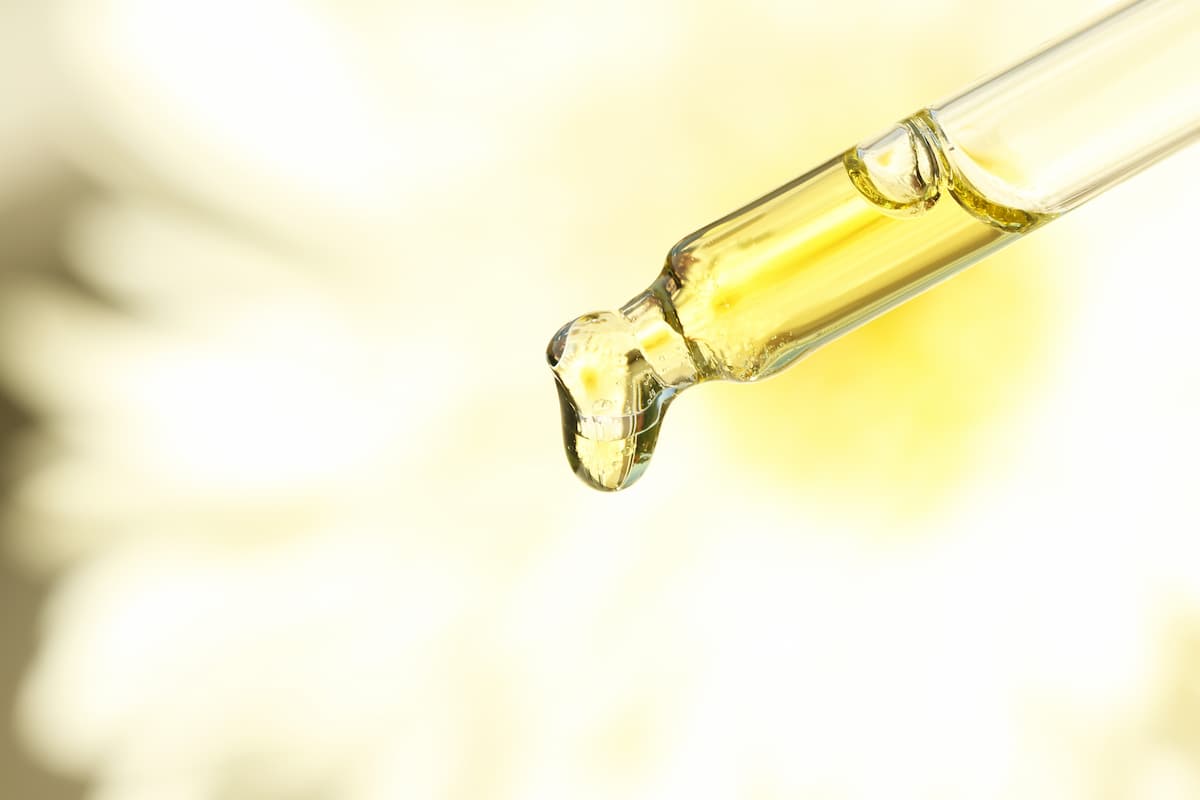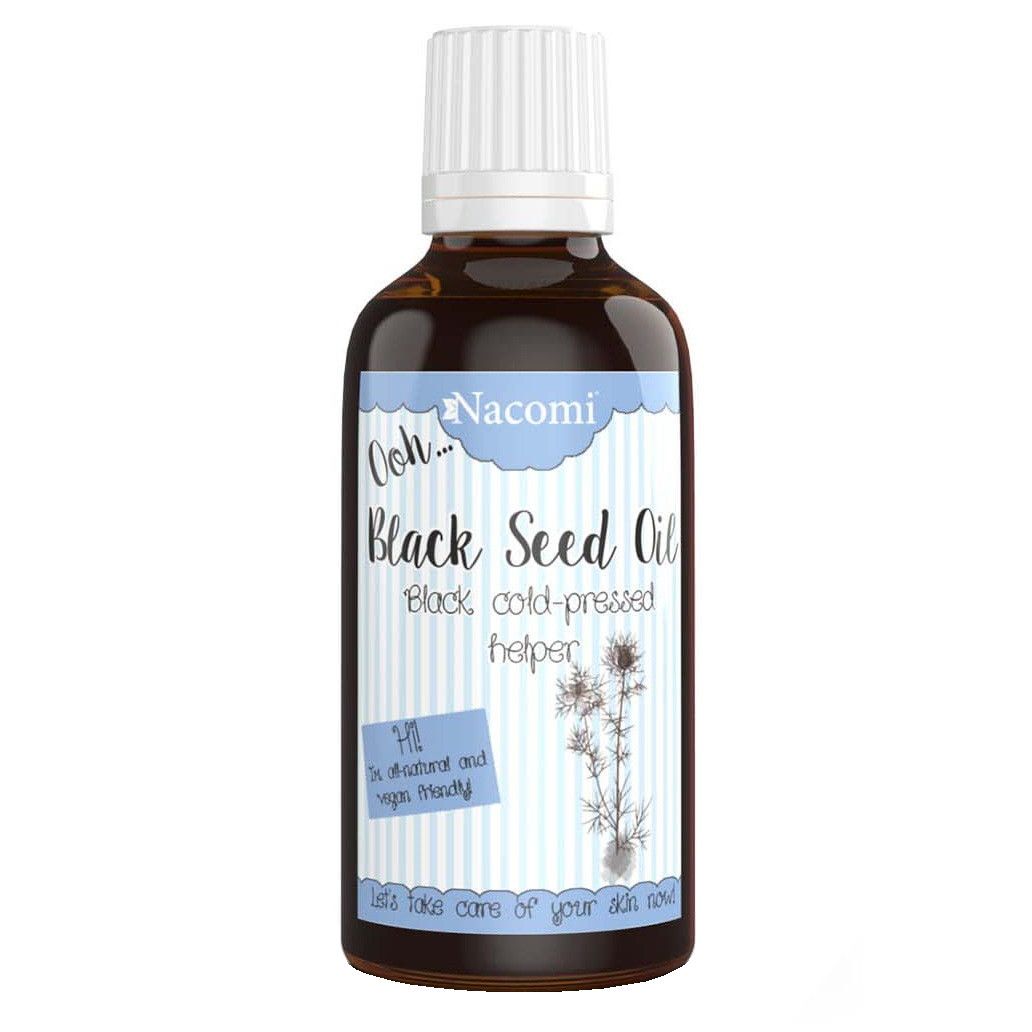Black cumin oil: properties, effects, side effects, doctors' opinions
Black cumin oil shows great potential in supporting the body.


Learn more about our editorial process
.

Learn more about our editorial process
.

Learn more about our editorial process
.

Learn more about our editorial process
.
Why you can trust us
Articles on Natu.Care are written based on scientific research, data from government websites and other reliable sources. The texts are written in cooperation with doctors, nutritionists and other health and beauty experts. Articles are reviewed before publication and during significant updates.
.Learn more about our editorial process
.Information about advertisements
Content on Natu.Care may contain links to products from the sale of which we may receive a commission. When creating content, we adhere to high editorial standards and take care to be objective about the products discussed. The presence of affiliate links is not dictated by our partners, and we select the products we review ourselves completely independently.
.Learn more about our terms and Conditions
.If the strength of an oil is determined by the intensity of its taste, cumin oil would be the strongest. This bitter and strongly aromatic specification has been used for centuries in traditional medicine. Inconspicuous in appearance, but "carnivorous" in taste, the plant can support the treatment of many ailments.
Learn about cumin oil. Say goodbye to seasonal 'goiter' in your child. Ensure proper cholesterol and blood sugar levels. Improve the condition of your skin and recommend nigella for your hair.
From this article you will learn:
- What is cumin oil and what properties it has. .
- What are the contraindications to use and possible side effects. .
- How to consume cumin oil safely - by adults and children. .
- How to choose good quality cumin oil. .
- Black cumin oil and doctors' opinions. .
See also:
.
Product description
Cold-pressed, unrefined, and biologically active black seed oil is known for its anti-inflammatory properties, making it suitable for irritated, problematic, acne-prone, and oily skin. It is rich in vitamin E, biotin, beta-carotene, and antioxidants. Black seed oil has anti-inflammatory, antioxidant, and anti-swelling effects. It is intended for the care of the face, body, and hair and can be applied either topically or over larger areas.
Pros and cons
Pros
- Face – Anti-aging effect, reduces wrinkles, improves skin elasticity, has anti-acne properties, regulates sebum production.
- Hair – Can be applied to the scalp or hair ends. Black seed oil has anti-dandruff, hair-strengthening, and growth-stimulating effects. Applied to the ends, it seals hair cuticles, nourishes, and conditions.
- Body – Cares for dry, sagging skin lacking color. It has anti-cellulite properties. Added to lotion, it moisturizes, nourishes, and gives the skin a healthy tone.
- Delays aging processes, supports the treatment of atopic dermatitis and lichen. Aids in the wound healing process.
Cons
- Small capacity
Black cumin oil - what is it?
.
Black cumin oil is extracted from the seeds of the black cumin plant (Latin: Nigella sativa). This plant is also known by the names black cumin, tares, maidenhair green, nigella. Black cumin is native to Eastern Europe and Western Asia. The seeds of this plant have the most health-promoting propertiesand.
Black cumin oil has been used in traditional medicine for more than 2,000 years for its many therapeutic benefits. It has been called the gold of the pharaohs. Its many properties are exploited by consuming it or applying it externally - to the skin and hairand.
The most important active ingredient in nigella oil is thymoquinone, which is responsible for its anti-inflammatory, anti-bacterial, anti-viral effects. It is said to be the active ingredient that "cures everything but death"..
 .
.
Julia SkrajdaDietitian
.Black cumin oil contains between 3.2 and 9.6 mg/ml of thymoquinone. The higher its concentration, the better its effect.
Composition and nutritional value of black cumin oil
.
Black cumin oil is a treasure trove of vitamins, minerals, polyphenols and omega acids.
In the composition ofblack cumin oil you will find:
.
- calcium, .
- iron, .
- zinc, .
- copper,
- potassium,
- vitamin B1 (thiamin), .
- vitamin B3 (niacin),
- phosphorus, .
- vitamin B9 (folic acid),
- omega acids: omega 3, omega-6, omega-9, .
- polyphenols, .
- tocopherols, .
- phytosterols, .
Black cumin oil is a wealth of omega acids.
Want to better understand their effects? Check out the articles:
Nutritional values of cumin oil in 100 g
. .
|
Nutritional value . |
Nutritional content |
|
Calories: . |
900 kcal |
|
Protein: |
0 g |
|
Fat: |
100 g |
|
Saturated fatty acids: . |
16 g |
|
Carbohydrates: . |
0 g |
|
Simple sugars: . |
0 g |
|
Fiber: |
0 g |
|
Salt: . |
0 g |
.
What does cumin oil taste like?
.
Wondering what this oil tastes like and whether it will suit you? My first sip I recall... intensely! Fortunately, there are ways to make drinking this oil a little more enjoyable.
Black cumin oil has a bitter, intense flavour that can 'scratch' the throat for some. This oil can be drunk by adding it to a cool drink, juice or honey - this will soften the taste sensation and the oil itself will not lose its value..
 .
.
Julia SkrajdaDietitian
.Properties and uses of cumin oil
.
Cherry has been recognised by scientists as, potentially, one of the most valuable and nutrient-rich plantsand. Numerous studies have been underway over the years seeking to confirm its traditional uses and health-promoting properties. What does the researchers' work to date suggest?
Antioxidant (antioxidant)
activity.
Black cumin oil is high in antioxidantsand. These compounds are important for health, as research suggests they can reduce inflammation in the body and protect against conditions such as heart disease and cancerand.
Thymoquinone, which has strong antioxidant and anti-inflammatory properties, is responsible for most of the health-promoting properties of nigella oil. Studies suggest that this compound may protect the brain and support the treatment of several types of cancerand.
Anti-inflammatory effects
.
Research suggests that inflammation in the body may contribute to the development of many chronic conditions such as type 2 diabetes, heart disease and cancer . Consuming cumin oil can reduce many markers of inflammation while increasing blood levels of antioxidants .
Antifungal potential
.
Research suggests that nigella oil, thanks to its thymoquinone content, may have antifungal activityand. It has a particularly promising effect on the yeast Candida albicans, which can lead to candidiasis (a fungal disease caused by the excessive multiplication of yeasts of the genus Candida in the body) .
Antimicrobial activity
.
Tymohydroquinone extracted from the volatile oil of black cumin seeds shows high efficacy against gram-positive and gram-negative microorganisms (bacteria), including Staphylococcus aureus, Escherichia coli or Escherichia coliand.
.
Black cumin extract has shown similar treatment effects to the topical antibiotic mupirocin applied to the skin. In another study, cumin with honey showed a synergistic antimicrobial effect in the treatment of blue bacillus infections .
As Dr Witold Tomaszewski, M.D., explains, due to the increasing resistance of many bacteria to antibiotics, the increased interest in the antibacterial properties of many substances of natural origin is understandable.
.
If tests reveal a bacterial infection, we cannot rely solely on cumin oil. We should consider this plant as a support, not as the main therapy to combat a bacterial infection.
 .
.
Witold Tomaszewskidoctor of medical sciences
.Body immune support
.
As you already know, nigella oil is a powerful antioxidant with anti-inflammatory properties. These properties promote immune enhancementand. Research suggests that this plant can fight viruses and stimulate immunityand. It is worth considering its consumption during the autumn and winter.
Black cumin oil is rich in omega acids, which have an anti-inflammatory effect, help the body fight infection, help the body recover faster during illness and support the immune system's response to pathogens..
 .
.
Julia SkrajdaDietitian
.Preventing metabolic syndrome
.
Many studies suggest that consuming black cumin oil can minimise metabolic syndrome risk factors by reducing belly fat, lowering blood sugar levels and improving cholesterol and blood pressureand.
Metabolic syndrome is a collection of co-occurring factors that may increase the risk of heart disease, stroke, type 2 diabetes, insulin resistance..
 .
.
Witold Tomaszewskidoctor of medical sciences
.Support for the treatment of skin problems
.
Black cumin oil has shown potential to support the treatment of some skin ailments such as psoriasis, acne, atopic dermatitis, vitiligoand. Research suggests that this may be related to the antibacterial and anti-inflammatory properties of this plantand.
One study involved 60 people with skin problems. Half of the subjects applied a placebo to their skin, while the other half applied a gel of black cumin oil to their skin lesions twice a day. After two months, the subjects using the black cumin oil reported a reduction in the number of blackheads, papules and pustulesand.
Effects on lipid metabolism
.
A lot of processed food high in sodium, eating on the run, chaotic menus and lack of exercise negatively affect our lipid metabolism.
Because of its content of essential fatty acids (EFAs), thymominion and phytosterols, nigella oil has a positive effect on the lipid profile. It lowers total cholesterol, LDL (bad cholesterol) and triglycerides..
 .
.
Julia SkrajdaDietitian
.Drinking cumin oil should be the first step towards diversifying our menu - consuming it alone, without dietary changes, will not have positive effects on our lipid profile.
Improving wound healing
.
The oil's valuable ingredient, thymoquinone, has been studied for its ability to stimulate tissue growth and promote wound healingand. A number of animal studies have shown that the compound can help treat burns, diabetic wounds and other skin injuries due to its anti-inflammatory, antioxidant and antimicrobial effects .
Promoting weight loss
.
Black cumin oil may prove helpful in the treatment of overweight and obesity. Studies to date are promising.
In one study, people who consumed 3g of cumin oil daily for eight weeks and followed a low-carb diet experienced greater reductions in weight and belly fat than those who followed a low-carb diet aloneand.
Another study of 45 overweight or obese women found that taking 2,000 mg of black cumin oil daily for 8 weeks reduced appetite and reduced body weight, waist circumference and body fat .
.
Important!
.Remember that nigella oil is calorie dense - it has as much as 900 kcal in 100 g. When it comes to its consumption, systematics rather than quantity is key. It is worth including it in your diet.
Effects on hormones
.
Research involving patients diagnosed with Hashimoto's endocrine disease suggests that nigella has the effect of improving thyroid function, reducing the severity of the disease, and has the effect of lowering TSH and anti-TPO hormonesand.
According to the researchers, given the health-promoting effects of this plant on reducing disease severity observed in studies, it may be considered a useful therapeutic approach for the treatment of Hashimoto's thyroiditis .
Asthma treatment support
.
Asthma is a disease in which the lining of the airways 'swells' and the muscles around them constrict, making it difficult to breathe. More than 260 million people worldwide suffer from asthmaand.
Research has shown that the thymoquinone in black cumin oil can support asthma treatment, by reducing inflammation and relaxing muscles in the airways .
Support for the treatment of rheumatoid arthritis
.
Rheumatoid arthritis (RA) is a serious autoimmune disease that causes, among other things, joint pain and significantly reduces the patient's activity. Research suggests that because of its anti-inflammatory effects, nigella oil may help reduce joint inflammation in people with RA.
You may be interested in: Collagen for joints
Improving male semen quality
.
The effects of black cumin oil on male fertility are not yet well studied, but the results of studies to date are promising. In one, the oil was shown to improve sperm quality in men diagnosed with infertility. In the subjects, sperm count increased and sperm motility was raised, and semen volume and pH index were improvedand.
Alleviation of menstrual discomfort
.
In scientific studies, black cumin oil has shown positive effects on many female ailments. It supports the regulation of the menstrual cycle and relieves symptoms of premenstrual syndrome (PMS). It regulates progesterone and oestrogen metabolism and is proven to support the treatment of women suffering from endometriosis and polycystic ovary syndrome (PCOS)and.
Support for allergy symptom relief
.
Rhinitis is a common reaction of the body to contact with allergens. To date, there is no effective treatment for this ailment, and most of the drugs used can only provide symptomatic relief. Some of them have unpleasant side effects and can cause withdrawal symptoms.
In a scientific study with allergic patients, the subjects used intranasal drops with black cumin oil. The topical effect of black cumin oil proved effective in the treatment of allergic rhinitis, with minimal side effects observedand.
.
Enhancing kidney and liver function
.
The antioxidant phytosterols and tocopherols in the composition of black cumin oil, combined with thymoquinone, may have anti-inflammatory and protective effects on the liver and kidneys.
Research into the effects of this oil on the liver suggests a reduction in liver enzyme levels in people with non-alcoholic fatty liver disease, reducing the degree of hepatic steatosisand.
The effects of black cumin oil suggest a positive effect on the resolution of complaints associated with diabetic nephropathy and chronic renal failure (vomiting, feeling weak, increased thirst) and shows an overall improvement in renal function..
 .
.
Julia SkrajdaDietitian
.Stabilising blood sugar levels
.
Research suggests that nigella oil may help improve many markers of blood sugar control, including insulin and fasting and post-meal blood glucoseand. This is particularly important for patients diagnosed with type 2 diabetes. Consistently high blood sugar levels increase the risk of kidney disease, eye disease and stroke .
In one study, people with type 2 diabetes who took 2g of crushed nigella seeds regularly had significantly lower fasting blood sugar and haemoglobin levels.
Learn about other plants with interesting properties and see what nature has to offer. Check out the articles:
What does cumin oil help with?
.
Research suggests that cumin oil helps with a number of ailments, including supporting weakened immunity, helping to treat asthma, allergies and rheumatoid arthritis (RA). Nigella also supports sugar and lipid metabolism and is a great antioxidant.
Please remember to consult your doctor before starting any treatment.
Cosmetic properties of nigella oil
.
Witch-hazel oil can also be found in the formulation of many cosmetic products. How does it work when applied externally? Are its properties as impressive as when you drink it?
.
Hair
.
If you use the popular little bottles of this oil, you know how cool it softens and smooths hair. Does it offer us anything more besides this effect?
.
Because of its antibacterial and antioxidant properties, this oil is often added to hair care products - masks, conditioners and shampoosand.
After applying nigella oil to the hair, it does indeed feel smoother, shinier and softer. However, this is an external effect - there is no evidence at this point that black cumin oil affects hair structure itself or hair growthand.
Black cumin oil can be applied to the scalp as a rub or massage for dandruff prevention. It is also helpful to oil the hair, which supports the regeneration process and helps to improve the moisture levels of the hair. When used as a protective preparation on the hair, nigella oil does not weigh it down and is quickly absorbed..
 .
.
Katarzyna SrebrCosmetologist
.See also:
.
skin
.
As you already know, nigella oil supports the treatment of many skin ailments (such as psoriasis or acne). Used for skincare purposes, it can soften the skin and act as a moisturiser. There is no conclusive research on the effect of black cumin oil on reducing wrinkles, but adequate skin moisturisation alone reduces or delays their appearanceand.
Black cumin oil, thanks to the essential oils nigellone and thymoquinone, also has external applications. It can be rubbed into the nail plate or scalp..
 .
.
Julia SkrajdaDietitian
.See also:
.
Black cumin oil dosage
.
The dosage of black cumin oil depends on your health, age and expected effects. Usually, no more than 1 tablespoon (10 g) per day is recommended, and in children, 1/4 to 1 teaspoon per day.
To make the most of the potential of cumin oil, first of all, it should be consumed systematically and in reasonable quantities. Focus on quality rather than quantity. Check out the dosage recommended by a clinical nutritionist.
How to use black cumin oil?
How to use cumin oil?
.
Recommended daily intake of black cumin oil:
.
- Children over 12 months: 1/4 teaspoon per day.
- Children aged 2-4 years: 1/2 teaspoon per day.
- Children over 5 years: 1 teaspoon per day.
- Adults: 1 teaspoon per day. .
In some adults, the daily intake may be increased to 2 tablespoons per day. This applies to people with thyroid diseases (hypothyroidism, Hashimoto's) and weakened immunity (e.g. after an infection or chronic fatigue). It is not recommended to exceed a portion of 1000 mg/day..
 .
.
Julia SkrajdaDietitian
.Black cumin oil - doctors' opinions
.
Black cumin oil has positive opinions from doctors and nutritionists due to its comprehensive health benefits. Nigella oil is not a substitute for medical treatment, but will be a nutritious and valuable addition to the diet. However, doctors warn to exercise caution in children under the age of 3.
.
Black cumin oil for children
.
Interest in black cumin oil for boosting immunity increases during autumn and winter. Children return from nursery or school with an infection, very often several times a month. Natural support for the young body is a good idea, but care must be taken.
Review of studies and paediatricians' opinions on the use of black cumin oil for children are inconclusive. On the one hand, it is worth supporting the child's immunity especially during the autumn and winter period, while on the other hand, it is important to ensure that the child's diet is nutritious and that he or she gets plenty of exercise outdoors, so that our child has a strong immune system.
Blackcurrant oil for children is a good idea.
Consult your doctor before you start giving your child black cumin oil. It may be that his frequent, recurring infections signify a chronic illness or other problems.
Black cumin oil has a very intense aroma and taste and it is easy to discourage your child from consuming it. Introduce this oil into your child's diet patiently. Initially treat it as a spice, smuggling it in various meals or adding it to natural raspberry or elderberry syrups..
 .
.
Julia SkrajdaDietitian
.Cherry oil in the kitchen
.
Not able to swallow cumin oil alone? No problem. Check out how a clinical nutritionist advises smuggling this valuable oil into your menu.
Black cumin oil is very intense in flavour, with a slight hint of bitterness, so it is worth combining it with equally intense flavours or similarly spicy flavours, such as:
- It works well as an addition to sauces based on hot spices such as chilli, smoked paprika, thyme, coriander, .
- it is a nice addition to cream soups, which have a distinctive flavour and will mask the flavour of the cumin oil somewhat, e.g. for pumpkin soup (you can add the roasted seeds to it), .
- for a taste break it can be added to sweet chocolate or cocoa oatmeal, puddings, fruit yoghurt, muesli, .
- it can be mixed with honey, raspberry syrup, elderberry syrup, apple or banana juice. .
Cherry oil must be consumed raw. It is not suitable for heat treatment as it loses its properties then. The oil should be stored at a temperature between 5 and 10°C, for a maximum of 3 months after opening..
 .
.
Julia SkrajdaDietitian
.Black cumin oil contraindications
.
Counterindications to the use of black cumin oil include: pregnancy, breastfeeding,
age under 12 months, planned surgery (black cumin oil may interfere with medications used during and after surgery), circulatory or blood clotting problems, use of certain medicationsand.
.
Interactions with medicines
.
Black cumin oil is a plant with very strong effects on the body. It can interact with some medicinesand - check when to be careful.
Black cumin oil may interact with the following medications:
.
- immunosuppressants, .
- anticoagulants, .
- diuretics, .
- medications used in psychiatry (e.g. sedative, anti-anxiety, antidepressants).
Side effects of using cumin oil
.
How is it possible that a plant with such amazing properties can cause unpleasant side effects? They usually affect people whoand:
- use black cumin oil against contraindications, .
- they do not check the interaction between this plant and the medications they are taking on a regular basis, .
- they overuse the oil, focusing on quantity rather than quality of consumption, .
- they improperly store the oil, .
The most common side effects of consuming cumin oil are:
.
- allergic rashes, .
- stomach upset, .
- nausea, .
- vomiting, .
- constipation, .
- burning sensation in the oesophagus and stomachand. .
Tip
.Do not consume cumin oil on an empty stomach. It is hard to digest and can backfire all day and irritate your stomach. It is best to consume it with a meal.
Consume it with a meal.
What is the best cumin oil?
.
If you want to take full advantage of the potential of the ingredients contained in cumin oil, choose the liquid form. It has several advantages over the capsules available on the market.
Cherry oil in liquid form
.
What are the characteristics of a good liquid oil?
.
- Natural and least processed form. Cold-pressing ensures the preservation of the oil's valuable ingredients.
- Freshness.
- Freshness - the oil should be pressed on order, rather than standing in a warehouse for several months.
- Suitable conditions for storage and transport. The oil should be placed in a dark glass and a special thermos to protect it from light and temperature during the transport period. .
All these conditions are met by the manufacturer of Olini nigella oil. Importantly, their product has the highest content of the valuable thymoquinone on the market. It amounts to as much as 7.63-8.54 mg/ml and has been confirmed by scientists from the University of Lodz.
The oil has a high thymoquinone content.
Black cumin oil in capsules - why not?
.
Black cumin oil in capsule form has several drawbacks that cast doubt on its quality. Why?"
- It is not known what quality of oil was used - when the pressing took place and when the oil was placed in the capsule.
- It is not known what quality of oil was used - when the pressing took place and when the oil was placed in the capsule.
- It is not known how it was transported and stored.
- It is not known how the oil was transported and stored.
- The usual long expiry date is not conducive to preserving the valuable properties of this oil. .
- The oil content per capsule is less than the recommended daily serving. This can mean ingesting several of them in a day, which proves to be unaffordable.
In addition to oil, nigella seeds are also worth consuming. They too have many valuable nutritional values. Just one tablespoon of seeds per day added to oatmeal, salad or a smoothie is enough..
 .
.
Julia SkrajdaDietitian
.See also:
.
If you have never drunk cumin oil, I recommend you add it to yoghurt, a smoothie, or alternatively consume it every day with someone's intention. For Mummy, for Daddy...It may not become your favourite treat, but it's really worth swallowing.
Let me know in the comments how you deal with the strong aftertaste or brag about how you convinced your child to drink cumin oil. Maybe your trick will help someone else.
.
Summary
.
Already have a plan for how to use cumin oil? Let's remind you again of the most important information from the article:
- Black cumin oil is extracted from the seeds of the black cumin plant.
- Thymoquinone is responsible for most of the health-promoting properties of black cumin oil.
- Thymoquinone is also responsible for most of the health-promoting properties of black cumin oil.
- Black cumin oil can have antioxidant, antifungal, antibacterial, immune-stimulating and antiviral effects.
- It can also have antioxidant, antifungal, antibacterial, immune-stimulating and antiviral effects.
- Consumption of this oil may be helpful for people with autoimmune diseases (especially thyroid diseases), skin problems, allergies, overweight and frequent infections. .
- The main contraindications for the use of nigella oil are pregnancy, breastfeeding, age under 12 months, possible interactions with medications. .
- Some people may experience side effects, but these can be minimised by reading the contraindications to use and consuming the oil sensibly. .
- Before you buy cumin oil, pay attention to the manufacturer - how they prepare the oil, how the oil is pressed, and how it is stored and transported.
FAQ
.Who should not drink cumin oil?
.Black cumin oil should not be consumed by: pregnant and breastfeeding women, children under 12 months of age, people with circulatory or blood clotting problems, people taking anticoagulants, immunosuppressants, diuretics, blood pressure lowering drugs and drugs used in psychiatry (e.g. tranquilizers).
Can you drink cumin oil on an empty stomach?
.It is not advisable to drink black cumin oil on an empty stomach, as even 1 tablespoon can irritate the stomach and cause unpleasant discomfort. In addition, the intense taste of cumin oil consumed solo can be discouraging and faint. It is best to drink the oil with a hearty meal.
.When is the best time to drink cumin oil?
.Cherry oil can be consumed at any time of the day as we are comfortable. It is important not to consume it on an empty stomach as it can act as a stomach irritant. It is best to drink cumin oil during a satiating meal, such as with dinner.
Does cumin oil lower blood pressure?
.Scientists studying the effects of this plant on hypertension are divided on the issue. On the one hand, an analysis of several scientific studies suggests that black cumin oil can lower blood pressure. However, there is a 2017 study that found that the reduction in blood pressure among participants with hypertension who received this oil was not significant compared to the placebo group.
Does cumin oil harm the liver?
.No, nigella oil does not harm the liver. Scientific studies indicate that its regular consumption in an optimal dose has no toxic effect on this organ. In contrast, excessive consumption of this oil can be dangerous. Remember - it is quality, not quantity, that counts.
After what time of use of cumin oil do you see results?
.Systematic consumption of black cumin oil can give positive results after just a few weeks. If you are drinking it because you have high cholesterol, you may want to do tests before starting the treatment and repeat them, for example, after 2 months of use.
If you are hoping to boost your immunity, over time you should notice a reduced number of infections or faster recovery. The effects on the hair, on the other hand, are immediate. Applying the oil to the ends of your hair softens them and makes them easier to comb.
Should cumin oil be stored in the fridge?
.Yes, cumin oil should be stored in the fridge, at a temperature of around 5-10°C. This allows it to retain its valuable properties for longer. The oil should go into the fridge even before it is opened.
How long can cumin oil be stored?"
.Cold-pressed oils, such as cumin oil, can be stored in the fridge for up to three months from the date of pressing. Note that it is the day of pressing that counts, not the day of opening. If you plan to gift the oil to someone, do not store it for too long.
Cold pressing - what does it mean?
.Cold pressing is the oldest, natural method of extracting oil from oilseeds. It takes place at a temperature no higher than 40-50°C. This preserves the nutritional values, especially of the unsaturated fatty acids, including the monounsaturated acids, which are the healthiest for our body.
.
Sources
.See all
.Akram Khan, M., & Afzal, M. (2016). Chemical composition of Nigella sativa Linn: Part 2 Recent advances. Inflammopharmacology, 24(2), 67–79. https://doi.org/10.1007/s10787-016-0262-7
Aljabre, S. H. M., Alakloby, O. M., & Randhawa, M. A. (2015). Dermatological effects of Nigella sativa. Journal of Dermatology & Dermatologic Surgery, 19(2), 92-98. https://doi.org/10.1016/j.jdds.2015.04.002
Ariamanesh, H., Tamizi, N., Yazdinezhad, A., Salah, S., Motamed, N., & Amanloo, S. (2019). The Effectiveness of Nigella Sativa Alcoholic Extract on the Inhibition of Candida Albicans Colonization and Formation of Plaque on Acrylic Denture Plates: An In Vitro Study. Journal of Dentistry, 20(3), 171-177. https://doi.org/10.30476/dentjods.2019.44911
Asthma. (n.d.). Retrieved 17 March 2023, from https://www.who.int/news-room/fact-sheets/detail/asthma
Choi, J. W., Kwon, S. H., Huh, C. H., Park, K. C., & Youn, S. W. (2013). The influences of skin visco-elasticity, hydration level and aging on the formation of wrinkles: A comprehensive and objective approach. Skin Research and Technology, 19(1), e349-e355. https://doi.org/10.1111/j.1600-0846.2012.00650.x
Eid, A. M., Elmarzugi, N. A., Abu Ayyash, L. M., Sawafta, M. N., & Daana, H. I. (2017). A Review on the Cosmeceutical and External Applications of Nigella sativa. Journal of Tropical Medicine, 2017, e7092514. https://doi.org/10.1155/2017/7092514
Farhangi, M. A., Dehghan, P., Tajmiri, S., & Abbasi, M. M. (2016). The effects of Nigella sativa on thyroid function, serum Vascular Endothelial Growth Factor (VEGF)-1, Nesfatin-1 and anthropometric features in patients with Hashimoto's thyroiditis: A randomized controlled trial. BMC Complementary and Alternative Medicine, 16(1), 471. https://doi.org/10.1186/s12906-016-1432-2
Gheita, T. A., & Kenawy, S. A. (2012). Effectiveness of Nigella sativa Oil in the Management of Rheumatoid Arthritis Patients: A Placebo Controlled Study. Phytotherapy Research, 26(8), 1246-1248. https://doi.org/10.1002/ptr.3679
Hallajzadeh, J., Milajerdi, A., Mobini, M., Amirani, E., Azizi, S., Nikkhah, E., Bahadori, B., Sheikhsoleimani, R., & Mirhashemi, S. M. (2020). Effects of Nigella sativa on glycemic control, lipid profiles, and biomarkers of inflammatory and oxidative stress: A systematic review and meta-analysis of randomized controlled clinical trials. Phytotherapy Research, 34(10), 2586-2608. https://doi.org/10.1002/ptr.6708
Hamdan, A., Haji Idrus, R., & Mokhtar, M. H. (2019). Effects of Nigella Sativa on Type-2 Diabetes Mellitus: A Systematic Review. International Journal of Environmental Research and Public Health, 16(24), Article 24. https://doi.org/10.3390/ijerph16244911
Khan, M. A. (1999). Chemical composition and medicinal properties of Nigella sativa Linn. InflammoPharmacology, 7(1), 15–35. https://doi.org/10.1007/s10787-999-0023-y
Kheirouri, S., Hadi, V., & Alizadeh, M. (2016). Immunomodulatory Effect of Nigella sativa Oil on T Lymphocytes in Patients with Rheumatoid Arthritis. Immunological Investigations, 45(4), 271-283. https://doi.org/10.3109/08820139.2016.1153649
Kolahdooz, M., Nasri, S., Modarres, S. Z., Kianbakht, S., & Huseini, H. F. (2014). Effects of Nigella sativa L. seed oil on abnormal semen quality in infertile men: A randomized, double-blind, placebo-controlled clinical trial. Phytomedicine, 21(6), 901-905. https://doi.org/10.1016/j.phymed.2014.02.006
Koshak, A., Koshak, E., & Heinrich, M. (2017). Medicinal benefits of Nigella sativa in bronchial asthma: A literature review. Saudi Pharmaceutical Journal, 25(8), 1130-1136. https://doi.org/10.1016/j.jsps.2017.07.002
Mohtashami, R., Fallah Huseini, H., Heydari, M., Amini, M., Sadeqhi, Z., Ghaznavi, H., & Mehrzadi, S. (2015). Efficacy and safety of honey-based formulation of Nigella sativa seed oil in functional dyspepsia: A double blind randomized controlled clinical trial. Journal of Ethnopharmacology, 175, 147-152. https://doi.org/10.1016/j.jep.2015.09.022
Mouri, Mi., & Badireddy, M. (2022). Hyperglycemia. In StatPearls. StatPearls Publishing. http://www.ncbi.nlm.nih.gov/books/NBK430900/
Namazi, N., Larijani, B., Ayati, M. H., & Abdollahi, M. (2018). The effects of Nigella sativa L. on obesity: A systematic review and meta-analysis. Journal of Ethnopharmacology, 219, 173-181. https://doi.org/10.1016/j.jep.2018.03.001
Okasha, E. F., Bayomy, N. A., & Abdelaziz, E. Z. (2018). Effect of Topical Application of Black Seed Oil on Imiquimod-Induced Psoriasis-like Lesions in the Thin Skin of Adult Male Albino Rats. The Anatomical Record, 301(1), 166-174. https://doi.org/10.1002/ar.23690
Potential influence of Nagella sativa (Black cumin) in reinforcing immune system: A hope to decelerate the COVID-19 pandemic. (2021). Phytomedicine, 85, 153277. https://doi.org/10.1016/j.phymed.2020.153277
Revue de pharmacopuncture. (n.d.). Retrieved 17 March 2023, from https://journal.ac/
Safi, S., Razmpoosh, E., Fallahzadeh, H., Mazaheri, M., Abdollahi, N., Nazari, M., Nadjarzadeh, A., & Salehi-Abargouei, A. (2021). The effect of Nigella sativa on appetite, anthropometric and body composition indices among overweight and obese women: A crossover, double-blind, placebo-controlled, randomized clinical trial. Complementary Therapies in Medicine, 57, 102653. https://doi.org/10.1016/j.ctim.2020.102653
Sallehuddin, N., Nordin, A., Bt Hj Idrus, R., & Fauzi, M. B. (2020). Nigella sativa and Its Active Compound, Thymoquinone, Accelerate Wound Healing in an In Vivo Animal Model: A Comprehensive Review. International Journal of Environmental Research and Public Health, 17(11), Article 11. https://doi.org/10.3390/ijerph17114160
Sarac, G., Kapicioglu, Y., Sener, S., Mantar, I., Yologlu, S., Dundar, C., Turkoglu, M., & Pekmezci, E. (2019). Effectiveness of topical Nigella sativa for vitiligo treatment. Dermatologic Therapy, 32(4), e12949. https://doi.org/10.1111/dth.12949
Soleymani, S., Zargaran, A., Farzaei, M. H., Iranpanah, A., Heydarpour, F., Najafi, F., & Rahimi, R. (2020). The effect of a hydrogel made by Nigella sativa L. on acne vulgaris: A randomized double-blind clinical trial. Phytotherapy Research, 34(11), 3052-3062. https://doi.org/10.1002/ptr.6739
Sparks, J. A. (2019). Rheumatoid Arthritis. Annals of Internal Medicine, 170(1), ITC1-ITC16. https://doi.org/10.7326/AITC201901010
Swarup, S., Goyal, A., Grigorova, Y., & Zeltser, R. (2022). Metabolic Syndrome. In StatPearls. StatPearls Publishing. http://www.ncbi.nlm.nih.gov/books/NBK459248/
.Yimer, E. M., Tuem, K. B., Karim, A., Ur-Rehman, N., & Anwar, F. (2019). Nigella sativa L. (Black Cumin): A Promising Natural Remedy for Wide Range of Illnesses. Evidence-Based Complementary and Alternative Medicine, 2019, e1528635. https://doi.org/10.1155/2019/1528635
Yousefi, M., Barikbin, B., Kamalinejad, M., Abolhasani, E., Ebadi, A., Younespour, S., Manouchehrian, M., & Hejazi, S. (2013). Comparison of therapeutic effect of topical Nigella with Betamethasone and Eucerin in hand eczema. Journal of the European Academy of Dermatology and Venereology, 27(12), 1498-1504. https://doi.org/10.1111/jdv.12033
Bamosa, A. O., Kaatabi, H., Lebdaa, F. M., Elq, A.-M. A., & Al-Sultanb, A. (2010). Effect of Nigella sativa seeds on the glycemic control of patients with type 2 diabetes mellitus. Indian Journal of Physiology and Pharmacology, 54(4), 344-354.
Padhye, S., Banerjee, S., Ahmad, A., Mohammad, R., & Sarkar, F. H. (2008). From here to eternity - the secret of Pharaohs: Therapeutic potential of black cumin seeds and beyond. Cancer therapy, 6(b), 495-510.
Rafati, S., Niakan, M., & Naseri, M. (2014). Anti-microbial effect of Nigella sativa seed extract against staphylococcal skin Infection. Medical Journal of the Islamic Republic of Iran, 28, 42.
Shokri, H. (2016). A review on the inhibitory potential of Nigella sativa against pathogenic and toxigenic fungi. Avicenna Journal of Phytomedicine, 6(1), 21-33.
.
Editorials
Meet the team


Editor
Graduate of Journalism and Artes Liberales at the University of Warsaw. Since 2017, he has been working with the biggest portals in Poland and abroad as an editor. Previously worked for 3 years in one of the leading pharmaceutical companies - he knows the health and beauty industry inside out. In his free time, he most enjoys playing tennis or skiing.

